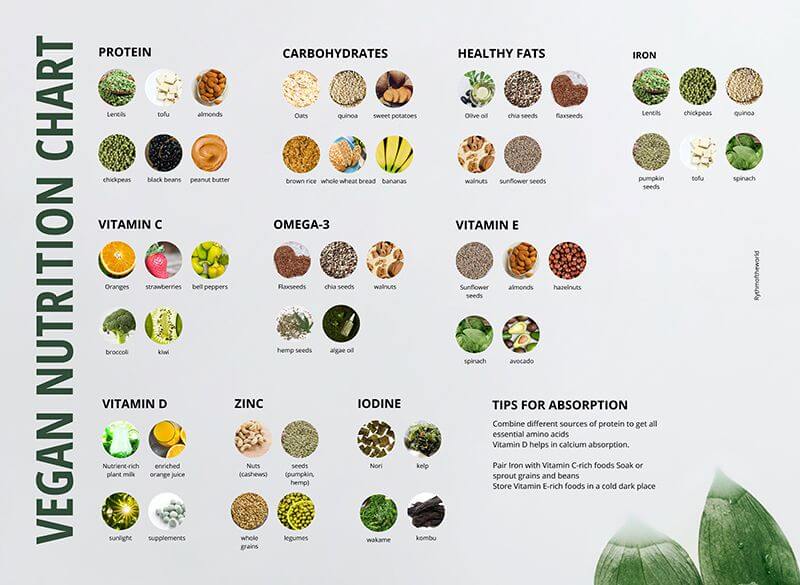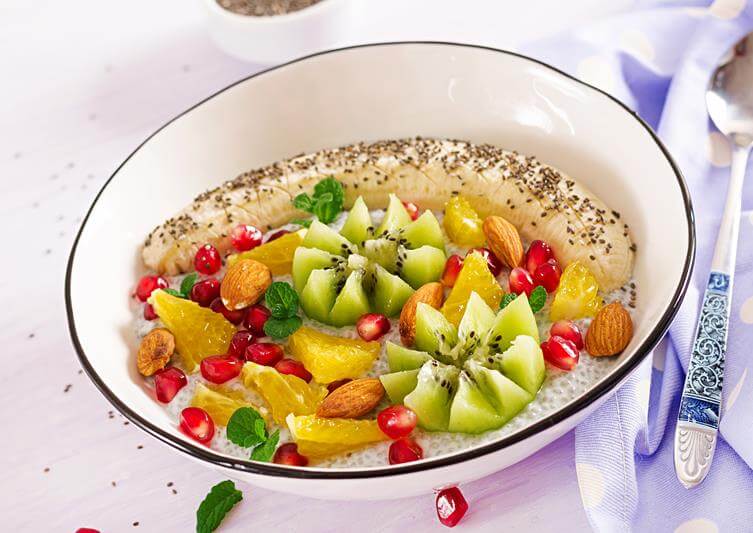The vegan diet is rapidly becoming popular, and more and more bloggers and athletes are switching to vegetarianism, online platforms and social networks advertise a huge number of delicious recipes. But to understand what products are included in the vegan list of this diet, how to add them to your daily diet, and how to combine them and keep the ingredients varied, you need to understand the body’s basic needs. This article provides a comprehensive guide to essential foods for a vegan diet, highlights key nutrients to monitor, and offers insights into fundamental nutrition planning without the need for precise calorie counting.
Understanding the Vegan Diet
Key Components and Essential Nutrients
The combination of vegetables and fruits, which form the foundation of a vegan diet, provides the body with fiber, vitamins, minerals, and antioxidants.
Therefore, it’s crucial to understand and estimate daily intake of:
- Dietary fibers;
- Protein;
- Fats;
- Total carbohydrates;
- Vitamins (Vitamin A, Vitamin C, Vitamin D, Vitamin E, Vitamin K, Vitamin B6, Vitamin B12, Thiamin, Riboflavin, Folate, Thiamin, Niacin, Pantothenic Acid, Biotin, Choline);
- Microelements (Calcium, Chromium, Copper, Fluoride, Iodine, Iron, Magnesium, Zinc, Manganese, Molybdenum, Phosphorus, Selenium, Potassium, Sodium, Chloride).
We have prepared a handy vegan nutrition chart to help you plan a balanced vegan diet easily and without any fuss.

According to the general recommendations of nutritionists, about 300-500 grams of fruit should be consumed daily as a source of fiber and vitamins (the necessary quantity of dietary fiber for adults and children older than 4 years per day is 28 grams). Such a product as legumes becomes a key source of vegetable protein for the body (the necessary quantity for adults and children older than 4 years per day is 50 grams ). It is also important to combine them with whole grain cereals for long-term satiety and the absence of a feeling of hunger. Vegetable fats the organism derives from nuts, seeds, and vegetable oil (the necessary quantity for adults and children older than 4 years per day is 78 grams).
Monitoring Nutritional Deficiencies
However, to ensure positive strength and health-giving, it is recommended to take some supplements to cover the deficiencies in the body.
For vegans, it is recommended to take the following supplements:
- Vitamin B12 (drink regularly to avoid its lack);
- Vitamin D (crucial in the winter or when there is a lack of sunlight);
- Iron (in the liquid form, combining them with vitamin C for better absorption);
- Two omega-3 fatty acids (DHA and EPA) in the form of algae supplements;
- Zinc;
- Calcium Iodine;
- Vitamin K2;
- Selenium (maintaining minerals).
To be on the safe side and always stay in a good mood, it is necessary to keep nutrients balanced.
Vegan Meal Planning: Focus on Balance, Not Numbers
To achieve the best results following vegan nutrition, try to use your hands as a guide for the required amount of food: carbohydrates are a fist-sized portion, proteins are a palm-sized portion, and fats are a thumb-sized portion). As the body senses the level of hunger or satiety, so adjust portion sizes depending on how hungry or full you are. Select different vegetables, grains, and proteins throughout the week to ensure a wide range of nutrients, adding fresh juicy fruits, berries, and vegetables to enlarge the intake of different vitamins and minerals. Talking about liquids, don’t forget to drink plenty of fluids, and replace herbal teas instead of coffee. Dilute fruit juices can also help maintain hydration. Avoid vegan junk food that is high in sugars, unhealthy fats, and sodium.
The “Rythm of the World” team strives to improve the world and maintain a healthy lifestyle. However, this article is intended for informational purposes only and does not constitute professional medical advice. For qualified advice, please contact your family doctor.

Author

Anna Smirnova
Former chemist, content writer on https://rythmoftheworld.com From my career as a chemist, I brought the skills of discovering, analyzing, filtration, separation, distillation, and explanation. I adore art, photography, traveling, hiking, and winter.



